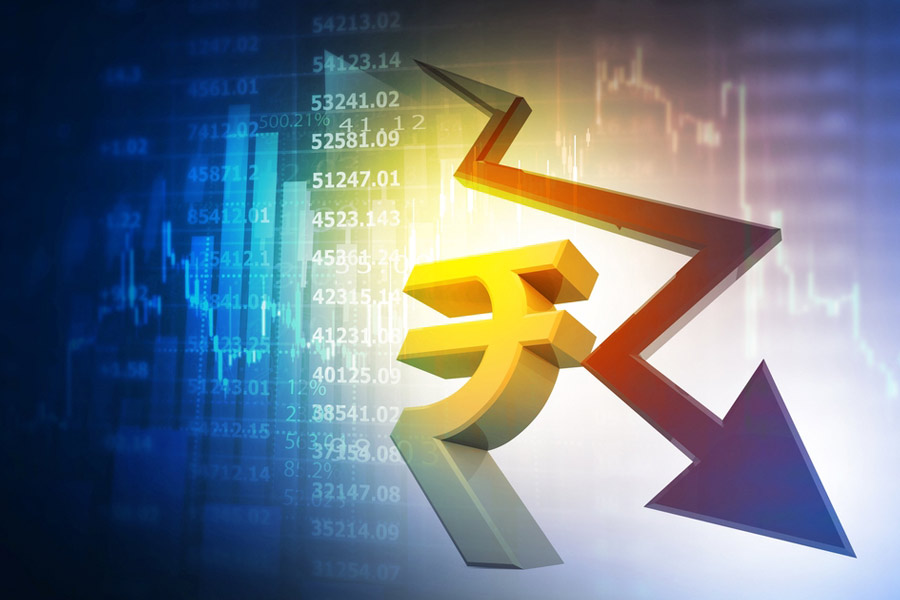The rupee depreciated to an all-time low of ₹84.73 against the dollar, with economic growth weakening in the second quarter, hardening of the dollar in overseas markets and foreign fund outflows weighing on the domestic currency.
At the interbank foreign exchange market, the rupee opened at ₹84.59 and touched the lowest level of ₹84.73 against the greenback during intra-day trades, registering a fall of 13 paise over its previous close. On Friday, the rupee had fallen to a low of ₹84.60 against the dollar.
In a little over four months, the Indian currency has depreciated a whole ₹1, with the rupee at the 83.72 mark against the dollar on July 19 (see chart).
Forex traders said Asian currencies were down after US President-elect Donald Trump threatened to slap 100 per cent tariffs on goods coming from Brics nations unless they backed down on their attempts to create a separate currency or desisted from trying to undermine the dollar’s dominance in world trade.
The dollar was up 0.19 per cent against the yen, 0.36 per cent against the Chinese yuan, 0.43 per cent against the Singapore dollar till 6PM on Monday. The Dollar Index, which gauges the greenback’s strength against a basket of six currencies was trading 0.38 per cent higher at 106.22 on Monday.
India’s economic growth slowed to a near two-year low of 5.4 per cent in the July-September quarter on sluggish performance in manufacturing and mining and weak consumer spending.
“We expect the rupee to trade with a negative bias on a strong dollar and FII outflows. A recovery in crude oil prices may also weigh in on the rupee. Donald Trump’s tariff threat may further strengthen the greenback,” said Anuj Choudhary, research analyst at Mirae Asset Sharekhan.
However, positive domestic markets may support the rupee at lower levels. Traders may take cues from US ISM manufacturing PMI data, Choudhary said adding the USD-INR spot rate is expected to trade in the range of ₹84.50-84.95.
The government defended the fall in the rupee on Monday, stating that It remains one of the “best-performing Asian currencies.”
“Major Asian currencies like Japanese Yen and South Korean Won declined 8.8 per cent and 7.5 per cent respectively as of November 19, 2024. Notably, all G10 currencies, except the British pound, depreciated over 4 per cent during Calender Year 2024,” Union minister of state for finance Pankaj Chaudhary said in a written reply to the Lok Sabha on Monday.
“The value of the rupee is market-determined, with no target or specific level or band. Various domestic and global factors influence the exchange rate of the INR, such as the movement of the dollar index,” the minister said.
Trump watch
The commerce ministry is reassessing the country's trade relationship with the US in light of comments made by president-elect Donald Trump, an official said.
The ministry's focus includes the implications of Trump's statements and their potential impact on bilateral trade. They plan to draw out strategies to deal with the new administration to strengthen the ties and navigate beyond the rhetoric.
"There are no significant irritants that could lead to discriminatory tariffs against India," the official said, addressing concerns stemming from Trump calling India a "tariff king".
Sensex up
Benchmark indices Sensex and Nifty ended higher on Monday amid buying in blue-chip stocks Reliance Industries, Infosys and HDFC Bank along with a firm trend in the US markets, reports PTI
Recovering the early lost ground, the BSE benchmark Sensex climbed 445.29 points or 0.56 per cent to settle at 80248.08. During the day, it hit a high of 80337.82 and a low of 79308.95.
Adani, GQG hit
Shares of six Adani Group firms ended lower on Monday, with Adani Total Gas falling nearly 5 per cent.
The stock of Adani Total Gas dropped 4.87 per cent to ₹772 on the BSE and Adani Energy Solutions tanked 4.04 per cent to ₹806.60.
The stock of Adani Green Energy Ltd surged ₹1,445 during the morning trade but later gave up most of the early gains and ended at ₹1,327.95, up 0.26 per cent.
Australian-listed GQG Partners fell 13 per cent after an UBS downgrade. The analysts estimated the firm could have lost A$600 million ($390 million) in funds under management following the indictment of the Adani group.











